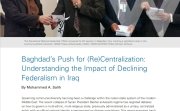

Middle East Program Research
Latest Research
Read the most recent briefs and reports published by the Middle East Program
Read Here

Posted date/time:

Rays of Optimism | Bright Spots in Foreign Policy
Posted date/time:

The Future of Euro-MENA Relations
Posted date/time:
Briefs & Reports
Read More
Middle East Dialogue February 2025 Meeting Report
Posted date/time:

Rays of Optimism | Bright Spots in Foreign Policy
Posted date/time:

The Future of Euro-MENA Relations
Posted date/time:
See all




Mohammed bin Salman: The Icarus of Saudi Arabia?
Posted date/time:

No-Win War: The Paradox of US-Pakistan Relations in Afghanistan's Shadow
Posted date/time:

The 19th Hijacker: A Novel
Posted date/time:
Explore more related to this collection
0
results
Your search did not return any results. Please try another search.

Middle East Program
The Wilson Center’s Middle East Program serves as a crucial resource for the policymaking community and beyond, providing analyses and research that helps inform US foreign policymaking, stimulates public debate, and expands knowledge about issues in the wider Middle East and North Africa (MENA) region. Read more



